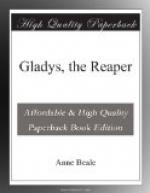Tom goes to a large building outside the farm-yard, whither his mistress and the rest follow him.
‘Plenty of straw, ma’am, good enough for such folk,’ says Tom.
‘Spread some more, and shut the window in the loft.’
This is done in a slow grumbling way.
The barn is a large, clean, airy building, that must look like a palace to these ragged, way-worn people.
’Now you may sleep here to-night, provided you go off early and quietly to-morrow morning. There is a good pump down below, where you can get water to wash yourselves, and at eight o’clock I shall lock the barn door; my husband always insists upon that.’ Thus speaks the mistress.
’Heaven bless his honour, we’re all honest. We wouldn’t harm a hair of your blessed heads. We heerd o’ ye many a time, and o’ the good lodgin’ and supper—the sun shine upon ye—ye give to the poor Irish on their thravels.’ Thus answers the Irishwoman.
’You tell one another then! And this is why we have more calls than any one else!’
’The Lord love ye, and why wouldn’t we? ’Tis the good as always gets the blessin’.’
Whilst this little conversation is going on, the girl, Gladys, is laid upon the shawl-blanket of the woman who wears that singular attire, and a pillow, half rags, half straw, is contrived for her head. The bonnet is taken off to increase her comfort, and, as her head falls languidly back upon the rough pillow, a wan, thin face is disclosed, that, from the regular outline of the profile, must be pretty, under happier circumstances, and is interesting.
Whilst the guests prepare to make themselves comfortable in different ways, the kindly farm-lady leaves them, amid many and enthusiastic blessings, and returns to the house.
In less than half-an-hour she reappears, followed by a female servant, both carrying tokens of a true hospitality that expects no return. She goes towards the poor girl with a small basin of good broth and a plate of toasted bread, such as might tempt the palate of a more dainty invalid; whilst the servant places a can of real Welsh broth, smelling strongly of the country emblem, the leek, in the midst of the hungry crew who are scattered over the barn. To this she adds various scraps of coarse bread and hard cheese, which she draws from a capacious apron, and evidently considers too good for the luckless vagabonds before her. She is soon, however, as much interested as her mistress in the sick girl, to whom the latter is administering the warm restorative. Spoonful after spoonful is applied to her lips, and greedily swallowed though with evident effort. The toasted bread is soaked in a portion of the broth, and is also devoured as speedily as offered, with an avidity made still more painful by the difficulty of swallowing, occasioned by some obstruction in the throat.
‘God help you, poor girl,’ says the good Samaritan, as she puts the last mouthful to the lips of the patient.




